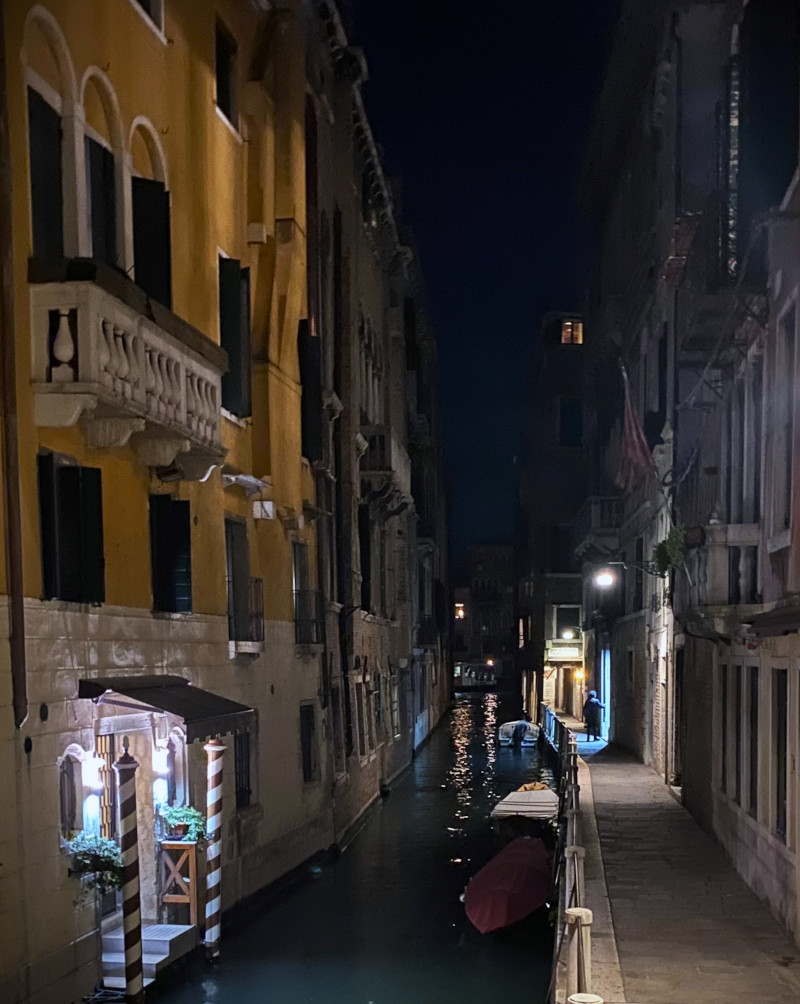The opening reception of the Biennale had ended early, Teatro La Fenice was dark, and I found myself with an unexpectedly free evening in Venice. Musica a Palazzo is one of many companies devoted to presenting small-scale classical music concerts in romantic locations, largely for tourists and often with free prosecco at intermission. I generally shy away from such spectacles—as do, I imagine, many readers of Opera Today—and the prospect of hearing Verdi’s La Traviata performed by an unnamed cast suspiciously billed as “Traveling Opera” did not inspire confidence. The promise of a palazzo, however, piqued my curiosity.
Located less than five minutes from bustling Piazza San Marco, the Palazzo Barbarigo Minotto inhabits an utterly different world. After winding along dim and deserted canals, having to backtrack several times, I entered an unlit alley no more than a meter wide, ending at an unmarked door. Inside was a gloomy, windowless room containing a few dozen nervous-looking foreigners. Sparafucile, the professional assassin of Verdi’s Rigoletto who prowls the nighttime streets of medieval Mantua, would have felt right at home.
At 8:00 sharp, a door suddenly opened and a young man in black-tie ushered us up an ancient stairwell into the dimly lit foyer of a once-elegant apartment. The first act of La traviata took place right there, the second in an adjoining sitting room, and the third in a nearby bedroom. In each spot, the small audience sat just a few feet away from the singers.

The results were magical. Before explaining why, however, let me concede the limitations of such a performance. Forty percent of Verdi’s score was cut, including all the choral scenes and smaller parts. The orchestra was replaced by three local players: pianist Alexandra Bochkareva and violinist Diego Cardin were spirited and precise, if a bit brash, while young cellist Federico Toffano was superbly stylish throughout.
From a technical standpoint, the singers were uneven. Strongest among them was an Italian-trained Cypriot baritone, Stavros Mantis, who has spent nearly two decades in Italian provincial houses, most recently that of Livorno. Slightly smoother legato and subtler dynamic variation might sometimes have been welcome, but his warmly resonant tone and imposing stage presence conjured a credible Giorgio Germont.
Federica Vinci is a very young singer from Trieste whose career to date has been almost exclusively in small theaters. She is not the soprano this company customarily casts as Violetta, and one can hear why: in bel canto portions of Act I, she sang with passion and clear diction, yet struggled to sweeten the high C’s and prudently ducked the (sometimes interpolated) final E-flat.
Veteran tenor Filippo Pina Castiglione won competitions back in the mid-1980s, studied with the legendary Alfredo Kraus, and now finds himself in the twilight of a four-decade career. A brittle and sometimes nasal timbre soon betrayed the fact that he is not quite as young as Alfredo is meant to be, but that fact did not prevent him from adding elegant touches of mezza voce throughout the night.
These basic shortcomings might have been damning in a major house, yet they seemed not to matter to the small but enthusiastic audience in the palazzo. Site-specific opera in a tight space is not about superstars delivering recording-quality vocal pyrotechnics. It is about total musical and dramatic commitment, no matter what—and that is just what this cast delivered.
Once past the arduous Act I coloratura, Vinci seemed to inhabit the doomed Violetta, combining youthful sincerity with frightening dramatic intensity. In the scene that lies at the heart of the opera, in which Germont convinces Violetta to betray Alfredo, her essentially lyric soprano contrasted perfectly with the stentorian admonitions of her illicit lover’s father, just as Verdi intended. The result was as emotionally raw as any rendition I have ever heard live. While Castiglione’s Alfredo remained slightly more detached throughout, his singing was suffused with a melancholy that lent the character unaccustomed depth.
Decisive for the evening’s success was not just the passionate commitment of the performers, but the setting. This once grand space, now decaying, dark and almost deserted, heightened the uniquely nostalgic sensibility of La traviata’s tragic denouement. No spot could be more appropriate to Violetta’s death than the palazzo’s bedroom, with its old-fashioned alcove, ornate antique friezes, and worn paint, all flickering in candlelight. In the opera’s final moments, the fourth wall seemed to crumble away entirely: we were not observing the action on stage as much as eavesdropping from inside the very room where it happened.
There is a deeper lesson here. Great big Verdi voices have grown rare, orchestras play too loudly, impresarios peddle hype and video rights, and stage directors douse productions with alienated irony. Audiences crave something different: simple and direct performances by singers who act as if what they are experiencing is real. Such performances remind spectators of the basic human passions at the core of Verdi’s masterpieces, which have kept them at the center of the repertoire for nearly two centuries. For that experience, few venues can surpass this modest Venetian palazzo.
Andrew Moravcsik
La Traviata
Music composed by Giuseppe Verdi
Libretto by Francesco Maria Piave (based on the play La Dame aux Camélias by Alexandre Dumas fils)
Cast and production personnel:
Federica Vinci – Violetta; Filippo Pina Castiglione – Alfredo Germont; Stavros Mantis – Giorgio Germont.
Patrizia Di Paolo – Stage Direction; Alexandra Bochkareva – Piano; Diego Cardin – Violin; Federico Toffano – Violincello.
Musica a Palazzo
Palazzo Barbarigo Minotto, Venice, Italy
18 April 2024